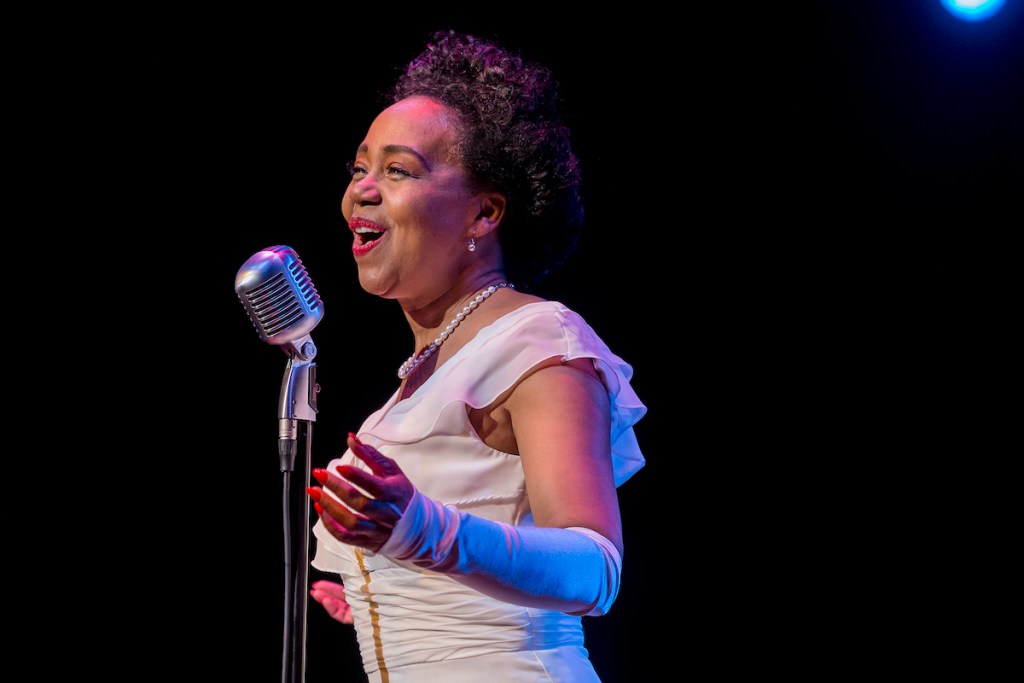Earthy, direct, and disdainful of conventional feminine roles from an early age, Billie Holiday’s reputation as an artist and an enduring icon of oppositional identity has only grown in the decades since her untimely passing in 1959 at the age of 44. In the outstanding production of Lady Day at Emerson’s Bar and Grill running now through September 5 as part of PCPA’s Solvang Festival Theater season, Karole Foreman commands the stage as Holiday, giving a sharply drawn, deeply felt performance that’s unforgettable in its immediacy.
Lady Day at Emerson’s isn’t a musical; it’s a play with music, and it includes more than a dozen songs and an equal number of revealing Holiday monologues. It has been widely produced since it premiered in the mid-’80s, when playwright Lanie Robertson got the idea to present the singer’s life through the lens of one shambolic late-career performance. The location, Emerson’s Bar and Grill, is a small, run-down joint in Philadelphia, a city for which Holiday had a strong and understandable dislike. The time is 1959, just a few months before the singer’s death, and she’s in rough shape, both physically and emotionally. In between songs, Holiday banters with her pianist, Jimmy Powers (here played by the excellent Stephan Terry, who is also the show’s music director), and spills her guts to the audience. Apparently unable or unwilling to let go of a long list of grievances, Holiday rages and reminisces, expressing a wide range of mostly negative emotions, from anger at the undercover cops who hounded her out of being able to perform in New York City to disappointment with her mother, the “Duchess,” who struggled with her own demons and let Holiday down more than once.
This edition of ON Culture was originally emailed to subscribers on August 13, 2024. To receive Leslie Dinaberg’s arts newsletter in your inbox on Fridays, sign up at independent.com/newsletters.
It’s well known that Holiday suffered mightily at the hands of law enforcement, and that her own outsized appetites compounded the problem. Foreman’s thoughtful performance lifts the painful details of Holiday’s ongoing struggles out of the swamp of misery and voyeurism and distills them until they register as an index of the hurt felt by an entire generation of Black artists. Her singing captures Holiday’s virtuosity and hints at her idiosyncrasies without ever stooping to the level of impersonation or mimicry. Over the course of the show’s 90 uninterrupted minutes, Foreman adds layer after layer of behavioral nuance, resulting in an achingly powerful cumulative impact. No doubt this production owes its surefooted pacing and nimble transitions in part to the experienced direction of Wren T. Brown, who developed the project in Long Beach and at the Ebony Theatre in Los Angeles.
What’s most memorable about this production, thanks to the beauty and honesty with which Foreman and Terry deliver the material, is the degree to which their reverence for the subject’s art resonates with the audience. In the context of Holiday’s chronic mental instability, her artistic achievement stands out all the more dramatically. When Foreman delivers the monologues that connect songs like “Strange Fruit” and “God Bless the Child” to their roots in Holiday’s personal experience, even those audience members who are hearing the music for the first time listen carefully and enter into communion with them. For example, knowing that Holiday wrote her finest and bleakest original song, “God Bless the Child,” about her difficult mother puts a keener edge on its already haunting ambivalence. It’s as though Holiday could, through the act of singing, inhabit a place apart from the pain of her self-destruction and the spectacle of her bad reputation. “I just want to sing,” she says more than once, and by the end of the show, one knows what that’s about. God bless the child that’s got his own.
Listen to the audio review here!
Support the Santa Barbara Independent through a long-term or a single contribution.

